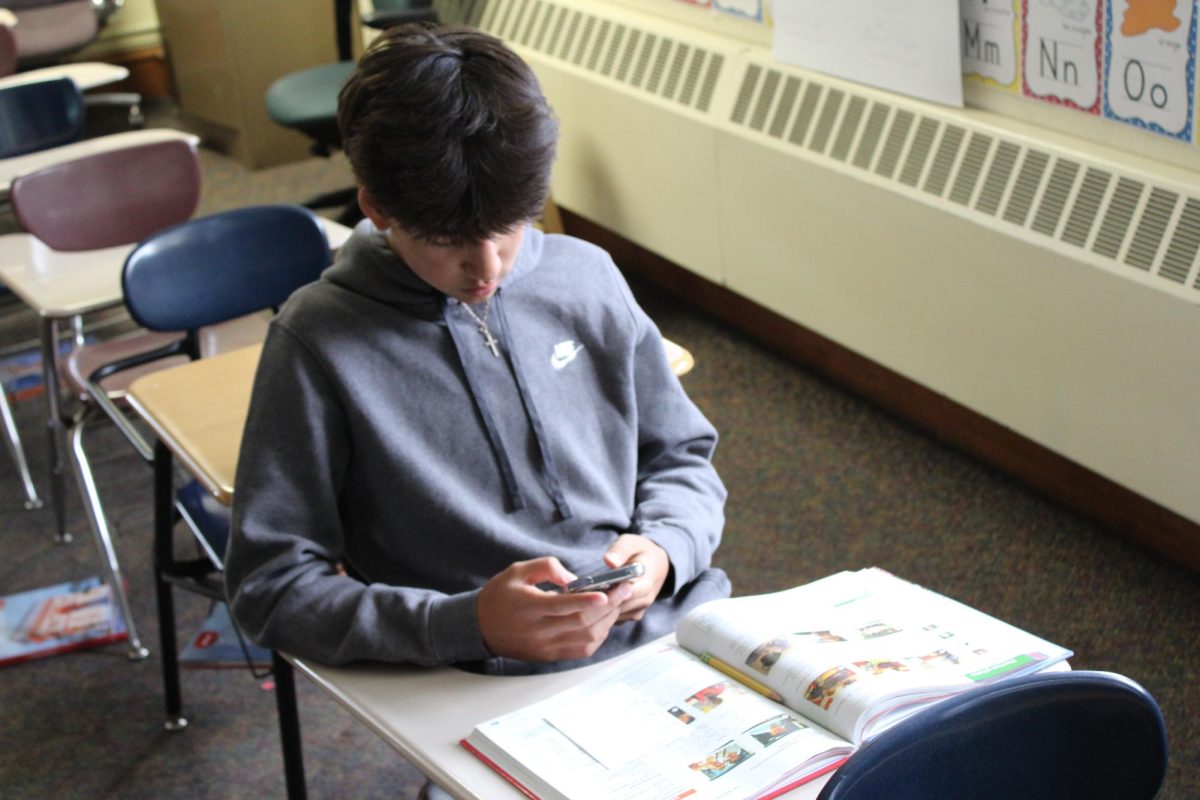Oscars season is upon us, and in the running for the most prestigious Academy Award, Best Picture, are films from biopics to historical tragedies to new holiday classics. The Register spoke with two of Central’s resident film fanatics, Claire Nipper and Jaden Cheloha, about their thoughts on the nominees.
“American Fiction”
In “American Fiction,” an African American author struggling to get published writes a stereotypically Black book that becomes highly acclaimed—by white people.
Nipper enjoyed the humorous moments of the satirical comedy; however, she felt that the movie’s trailer, which she had seen four times before watching, spoiled most of the jokes.
Cheloha had a fresher viewing experience than Nipper by going into it blind. “I really did enjoy the half of the movie that was focused on, you know, the satirical comedy,” Cheloha said. “Then, it did do a really bad job of balancing that with an odd amount of a just straightforward family drama.”
“It’s an issue of a movie being broken up into two parts and then they don’t meld with each other, and you prefer one over the other, so you spend half the movie waiting to get back to the part you enjoy,” Cheloha said.
“Anatomy of a Fall”
A trilingual film set in France; “Anatomy of a Fall” chronicles the criminal trial of a wife accused of pushing her husband to his death out of their chalet window.
“It’s a slow burn of slowly peeling back the layers of Sandra Hüller’s character and her husband,” Cheloha said. “It plays really well into how it affects their kid, Daniel.”
While the movie was two-and-a-half hours long and Nipper is typically opposed to lengthy movies, she didn’t mind its length. “I don’t like long movies, and it was good,” Nipper said.
A standout feature of the film was flashbacks from inside the courtroom to the events before the father’s fall. “They integrate it into the story in a very efficient way,” Cheloha said.
Viewers, look out for a standout performance—by a dog. “I’m very impressed with whoever was training that dog,” Cheloha said.
“Barbie”
Cheloha and Nipper both enjoyed Barbie, an ode to womanhood that chronicles the titular Mattel doll as she is thrust into the real world, where she must face a patriarchal society vastly different from her home, Barbieland.
“I do think it was, not made by the performances, but that is what kind of drove home the movie,” Cheloha said. Referencing Ryan Gosling, Cheloha exclaimed, “He gets the Ken!”
“The part where Ken is playing guitar at Barbie is the hardest I’ve ever laughed at a movie in my life because that has happened to me on at least five different occasions,” Nipper said.
Despite being popularized as a feminist movie, “It really didn’t have that much more to say about feminism than any other movie,” Nipper said.
Cheloha took issue with a lack of balance between scenes in Barbieland and in the human world. “When we go to the real world, it loses a lot of what Greta Gerwig was doing so well in terms of direction,” Cheloha said.
“The Holdovers”
Directed by Omahan Alexander Payne, “The Holdovers” is about an unlikely friendship between a student, a professor, and the cook of a New England boarding school who are stuck on campus for the winter holidays.
Cheloha was initially indifferent about the movie. “The first time I watched it, it was difficult to think of it as anything more than just, it was a chill, you know, holiday movie with a few emotional beats,” he said.
“But then, I watched it again, with my family, and a lot of stuff started to unlock …” Cheloha said. “And just every emotional beat is so meticulously planned out.”
According to Cheloha, “The Holdovers” actors Da’Vine Joy Randolph, Paul Giamatti, and Dominic Sessa perfectly encapsulated holiday melancholy and camaraderie.
Cheloha feels that to fully understand its cultural significance, its watchers must “let it simmer.” “It’s a movie where you know it’ll get better with every rewatch,” he said.
“Killers of the Flower Moon”
“Killers of the Flower Moon,” adapted from a book of the same name, tells the true story of the once-wealthy Osage Nation and how the U.S. government sought and succeeded in ending this prosperity.
An attribute of the movie that has turned many people away is its three-and-a-half-hour runtime. “I haven’t seen it, but I know it’s too long,” Nipper said.
“It doesn’t waste its run time that much,” Cheloha said. In fact, he was shocked at how efficient the movie was.
Cheloha also admired the deceptively beautiful cinematography. “When you see a still frame of it, it’s gray, and it doesn’t make sense for me to say, ‘This was a visual feast,’” Cheloha said. “But it is!”
Cheloha admits that the movie is not for everyone, but said, “You just have to watch it and experience the scale …”
“Maestro”
“An Oscar bait biopic is not the most interesting two-hour experience to spend your Sunday,” Cheloha said of “Maestro.”
Written, directed, produced and starring Bradley Cooper, the film focuses on the tumultuous professional and family life of composer Leonard Bernstein.
“What’s interesting to me is how impressed I am with Bradley Cooper as a director,” Cheloha said. Cheloha was particularly pleased with the first act, which took place in the 50s and appeared in black and white. “It [was] shot with such respect to the time,” he said.
Cooper earned Cheloha’s respect as a filmmaker but lost some of this respect for casting himself in what Cheloha called “a vanity project.”
Nipper has heard mixed opinions about “Maestro,” and she is firm in her decision to not watch it. Cheloha doesn’t blame her. “It doesn’t say anything about Leonard Bernstein’s life or his influence on the world …” he said.
“Oppenheimer”
“It is as straightforward of a movie that Christopher Nolan can make,” Cheloha said of “Oppenheimer.”
The other biopic nominated for 2023’s Best Picture, “Oppenheimer,” follows Robert J. Oppenheimer from getting an education to teaching physics to leading the creation of the atomic bomb in Los Alamos, Nevada.
Cheloha and Nipper’s main disagreement on “Oppenheimer” is the pacing. “Yes, there are minor pacing issues,” Cheloha said. “Major pacing issues,” Nipper interjected.
Nipper thinks that some scenes could have been cut, especially in the beginning. While she enjoyed the cinematography, she didn’t believe there were any standout acting performances.
Conversely, “You can talk about every technical element of it, and it is perfect,” Cheloha said.
“If somebody else besides Christopher Nolan made it, … it would not have worked.”
“Past Lives” – Jaden’s Pick
In “Past Lives,” two childhood friends who were separated at a young age reunite in their adulthood and contemplate a relationship that could have been.
“I was rewinding it as I was watching it just to catch lines again,” Cheloha said. “The screenplay made the movie, and then you had amazing performances to deliver them.”
Unlike its contenders for Best Picture, Cheloha and Nipper thought “Past Lives” was too short. “You stay with them at the most important times, like you’re with them, and none of it feels wasted,” Cheloha said. “Frankly, it could’ve been a little longer, but that’s nothing to fault the movie on.”
Nipper explained that movies like “Past Lives” are easy for viewers to connect with. “Nothing … crazy happens to them, but it’s beautiful because it’s just humanity,” Nipper said.
“It was engrossing,” Cheloha said. “It was a fully realized experience.”
“Poor Things” – Claire’s Pick
The film follows a recently resurrected woman living in Victorian London who gets swept away by a lawyer and travels across the continents on a journey of self-discovery.
“Poor Things” is the one exception to the “don’t watch the trailer rule.” Nipper thinks the trailer does an excellent job of not spoiling any major plot points and showing off the film’s cinematography. Watchers are in for a “visual delight,” Cheloha said.
Nipper also enjoyed the acting, shouting out the performances of Emma Stone (Bella), Willem Dafoe (Godwin) and Mark Ruffalo (Duncan).
“Some of my friends don’t like it because it’s supposed to be this feminist movie, but I really think it’s supposed to be a satirical portrayal of it,” Nipper said. “I feel like it’s very obviously a satirical portrayal of white feminism.”
“[‘Poor Things’ director] Yorgos Lanthimos isn’t for everybody,” Nipper said. “I’d say that you should start with his other movies, but they’re probably going to make you more uncomfortable.”
“The Zone of Interest”
“The Zone of Interest” centers on a family of Nazis, the patriarch being the commander of Auschwitz. The family’s carefree lives contrast with the horrors of the concentration camp their house shares a wall with.
“It’s very much the banality of evil,” Nipper said.
Interestingly, “this movie goes out of its way to not show direct violence or harm,” Cheloha said. The inside of Auschwitz is not shown, so “you have to extrapolate from what you’re seeing visually because what you’re seeing is ‘normal people,’” Cheloha added.
The movie is just as much of an audio experience as a visual one, and Cheloha thinks it deserves its Best Sound Design Oscar nomination.
Cheloha and Nipper believe “The Zone of Interest” shifts the way that its viewers typically think about the Holocaust. It reiterates that “nobody can really understand it unless they were there,” Nipper said.
HONORABLE MENTIONS
“La Sociedad de la Nieve (Society of the Snow)”
“This movie is the most perfect depiction of a tragedy I have ever seen in my entire life,” Nipper said.
“The Boy and the Heron”
“[Director Hayao] Miyazaki is above the Oscars,” Nipper said. “His talent is not comparable to any other movie that’s ever been made.”



















